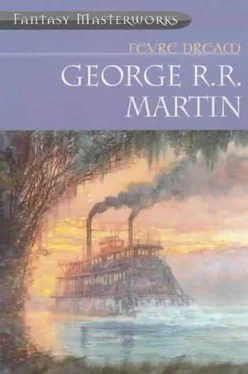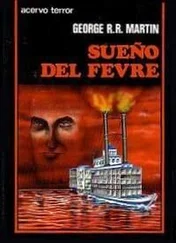George Martin - Fevre Dream
Здесь есть возможность читать онлайн «George Martin - Fevre Dream» весь текст электронной книги совершенно бесплатно (целиком полную версию без сокращений). В некоторых случаях можно слушать аудио, скачать через торрент в формате fb2 и присутствует краткое содержание. Жанр: Фэнтези, на английском языке. Описание произведения, (предисловие) а так же отзывы посетителей доступны на портале библиотеки ЛибКат.
- Название:Fevre Dream
- Автор:
- Жанр:
- Год:неизвестен
- ISBN:нет данных
- Рейтинг книги:4 / 5. Голосов: 1
-
Избранное:Добавить в избранное
- Отзывы:
-
Ваша оценка:
- 80
- 1
- 2
- 3
- 4
- 5
Fevre Dream: краткое содержание, описание и аннотация
Предлагаем к чтению аннотацию, описание, краткое содержание или предисловие (зависит от того, что написал сам автор книги «Fevre Dream»). Если вы не нашли необходимую информацию о книге — напишите в комментариях, мы постараемся отыскать её.
Fevre Dream — читать онлайн бесплатно полную книгу (весь текст) целиком
Ниже представлен текст книги, разбитый по страницам. Система сохранения места последней прочитанной страницы, позволяет с удобством читать онлайн бесплатно книгу «Fevre Dream», без необходимости каждый раз заново искать на чём Вы остановились. Поставьте закладку, и сможете в любой момент перейти на страницу, на которой закончили чтение.
Интервал:
Закладка:
Abner Marsh knew even before he started that it was near hopeless. Between Cairo and New Orleans alone, there was some eleven hundred miles of river. Then there was the upper Mississippi above Cairo all the way to the Falls of St. Anthony, there was the Missouri, there was the Ohio and the Yazoo and the Red River and about fifty other secondary rivers and tributaries navigable by steamer, most of which had tributaries of their own, not to mention all the little creeks and streams and cutoffs that were navigable part of the year, if you had a good pilot. She could be hiding up any one of them, and if the Eli Reynolds steamed past and missed her, it would mean starting all over again. Thousands of steamboats plied the Mississippi river system, with newcomers entering the trade every month, which meant lots of damned names to sort through in the papers. But Marsh was nothing if not stubborn. He searched, and the Eli Reynolds became his home.
She did not get much trade. The biggest, fastest, most luxurious steamboats on the river competed in the St. Louis-to-New Orleans run, and the Reynolds, old and slow as she was, attracted little custom away from the great side-wheelers. “It’s not just that she’s fast as a snail and twice as ugly,” Marsh’s New Orleans agent told him in the fall of 1858, while giving notice to take another job. “It’s you, too, damned if I ain’t telling the truth.”
“Me?” Marsh roared. “What the hell you mean?”
“Folks on the river talk, y’know. They say you’re the unluckiest man ever to own a steamboat. They say you got some kind of curse on you, worse’n the curse on the Drennan Whyte. One of your steamers blew her boilers, they say, and killed everybody. Four got crushed up in an ice jam. One got burned after everybody on her died of yaller fever. And the last one, they say you wrecked her yourself, after you went crazy and beat your pilot with a club.”
“Damn that man,” Marsh swore.
“Now, I ask you, who the hell is goin’ to ride with a cursed man like that? Or work for him either. Not me, I tell you that for sure. Not me.”
The man he’d hired to replace Jonathon Jeffers begged Marsh more than once to take the Reynolds out of the New Orleans trade, and have her work the upper Mississippi or the Illinois, where she’d be better suited, or even the Missouri, which was rough and dangerous but enormously profitable if your steamboat didn’t get smashed to splinters. Abner Marsh refused, and fired the man when he persisted. He figured there was no chance that he’d find the Fevre Dream on the northern rivers. Besides, during the last few months he’d been making secret stops by night at certain Louisiana woodyards and deserted islands in Mississippi and Arkansas, taking on runaway slaves and bringing them up north to the free states. Toby had put him in touch with a bunch called the Underground Railroad, who made all the arrangements. Abner Marsh had no use for the goddamned railroads and insisted on calling it the underground river, but it made him feel good to help, kind of like he was hurting Damon Julian somehow. At times he’d hunker down with the runaways on the main deck, and ask them about night folks and the Fevre Dream and such, figuring that maybe the blacks knew things that white folks didn’t, but none of them ever told him anything useful.
For nearly three years, Abner Marsh continued his hunt. They were hard years. By 1860 Marsh was heavily in debt due to the losses incurred in running the Reynolds. He had been forced to close the offices he had maintained in St. Louis, New Orleans, and other river towns. Nightmares no longer troubled him as they had, but he grew more and more isolated with the passage of years. At times it seemed to Marsh as if the time he had spent with Joshua York on the Fevre Dream was the last real life he had known, that the months and years since were drifting past as if in a dream. At other times, he felt just the opposite, felt that this was real, the red ink in his ledger books, the deck of the Eli Reynolds under him, the smell of her steam, the stains on her new yellow carpet. The memories of Joshua, the splendor of the great steamboat they had built together, the cold terror that Julian had stirred in him, these things were the dream, Marsh thought, and no wonder they had vanished, no wonder that folks along the river thought him mad.
The events of the summer of 1857 became even more dreamlike as, one by one, those who had shared some of Marsh’s experiences began to drift out of his life. Old Toby Lanyard had gone east a month after they had returned to St. Louis. Being returned to slavery once had been enough for him, now he wanted to get as far from the slave states as possible. Marsh got a brief letter from him early in 1858, saying that he’d gotten a job cooking in a Boston hotel. After that he never heard from Toby again. Dan Albright had found himself a berth on a spanking new New Orleans side-wheeler. In the summer of 1858, however, Albright and his boat had the misfortune to be in New Orleans during a virulent outbreak of yellow fever. It killed thousands, including Albright, and eventually led to the city improving its sanitation so it wasn’t quite so much like an open sewer in summer. Captain Yoerger ran the Eli Reynolds for Marsh until after the season of 1859, when he retired to his farm in Wisconsin, where he died peacefully a year later. When Yoerger had gone, Marsh took over captaining the stern-wheeler himself, to save money. By then only a handful of familiar faces remained among the crew. Doc Turney had been killed and robbed in Natchez-under-the-hill the previous summer, and Cat Grove had left the river entirely to go west, first to Denver, then to San Francisco, and eventually all the way to China or Japan or some such godforsaken place. Marsh hired Jack Ely, the old second engineer from the Fevre Dream, to replace Turney, and took on a few of the other crewmen who’d served on the vanished side-wheeler as well, but they died or drifted on or took other jobs. By 1860, only Marsh himself and Karl Framm were left of all those who had lived through the triumph and terror of 1857. Framm piloted the Reynolds, for all that his skills entitled him to a much bigger and more prestigious boat. Framm remembered a whole lot of things he wouldn’t talk about, even to Marsh. The pilot was still good-natured, but he didn’t tell near so many stories as he used to, and Marsh could see a grimness in his eyes that hadn’t been there before. Framm wore a pistol now. “In case we find them,” he said.
Marsh snorted. “That little thing ain’t goin’ to hurt Julian none.”
Karl Framm’s grin was still crooked, and his gold tooth caught the light, but there was nothing funny in his eyes when he answered. “Ain’t for Julian, Cap’n. It’s for me. They ain’t getting me alive again.” He looked at Marsh. “I could do the same for you, if it comes to that.”
Marsh scowled. “It ain’t comin’ to that,” he said, and he left the pilot house. He remembered that conversation for the rest of his days. He also remembered a Christmas party in St. Louis in 1859, given by the captain of one of the big Ohio boats. Marsh and Framm both attended, along with every other steamboatman in the town, and after everybody had been drinking some they got to telling river stories. He knew all the stories, but it was kind of peaceful and reassuring somehow to hear folks telling them all over again to the traders and bankers and pretty women who hadn’t ever heard none of them. They talked about Old Al the alligator king, about the phantom steamer of Raccourci, about Mike Fink and Jim Bowie and Roarin’ Jack Russell, about the great race between the Eclipse and the A.L. Shotwell, about the pilot who’d run a nasty stretch of river in the fog even though he’d gone and died, about the goddamn steamboat that had brought smallpox up the river twenty years before and killed something like twenty thousand Indians. “Ruined the hell out of the fur trade,” the storyteller concluded, and everybody laughed, except Marsh and a couple of others. Then someone went through the brags about the impossibly big steamers, the Hurricano and the E. Jenkins and such, that grew their own wood with forests on their hurricane decks, and had wheels so big they took a whole year to make a full turn. Abner Marsh smiled.
Читать дальшеИнтервал:
Закладка:
Похожие книги на «Fevre Dream»
Представляем Вашему вниманию похожие книги на «Fevre Dream» списком для выбора. Мы отобрали схожую по названию и смыслу литературу в надежде предоставить читателям больше вариантов отыскать новые, интересные, ещё непрочитанные произведения.
Обсуждение, отзывы о книге «Fevre Dream» и просто собственные мнения читателей. Оставьте ваши комментарии, напишите, что Вы думаете о произведении, его смысле или главных героях. Укажите что конкретно понравилось, а что нет, и почему Вы так считаете.












